Analysis of Breach of Director's Duty in Brunninghausen v Glavanics
VerifiedAdded on 2020/02/24
|8
|2512
|78
Case Study
AI Summary
This case study analyzes the breach of director's duty in the case of Brunninghausen v Glavanics. The appellant, a director and majority shareholder, negotiated the sale of company assets without informing the respondent, a sleeping director and shareholder. The court addressed the existence of a fiduciary duty between a director and shareholder, emphasizing that it's fact-based, not status-based. The judgment criticized the trial court's redefinition of corporate structure under the Corporations Act. The appellate court held that a director owes a fiduciary duty to shareholders when negotiating share sales, requiring full disclosure of information. The case examines the director's obligations, shareholder rights, and the impact of director actions on shareholder interests, highlighting the importance of transparency and fair dealing in corporate governance. The case study also discusses the circumstances in which a director owes fiduciary duties to shareholders, particularly in situations involving the sale of shares or the acquisition of capital. It emphasizes the potential for conflict of interest and the importance of prioritizing joint interests over personal gain.
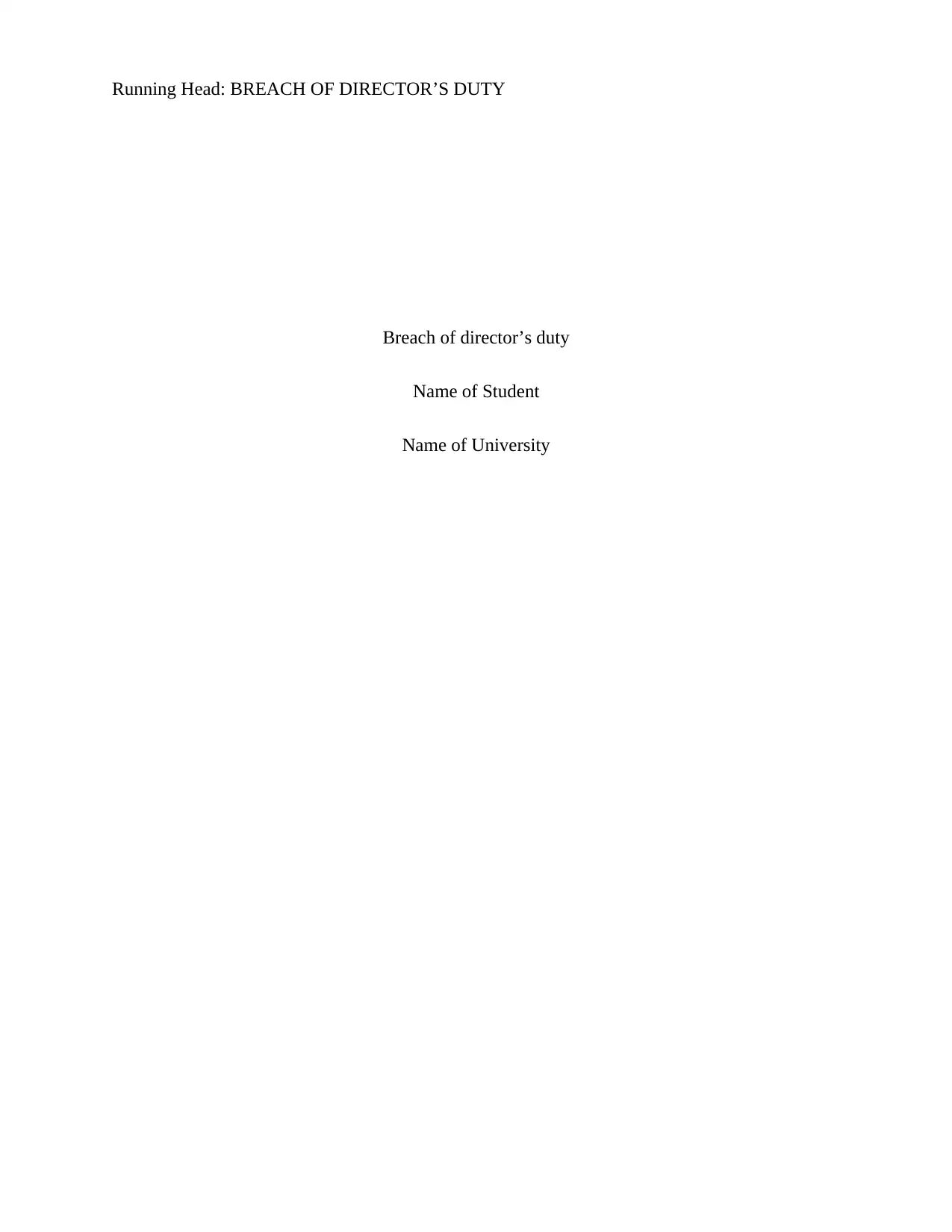
Running Head: BREACH OF DIRECTOR’S DUTY
Breach of director’s duty
Name of Student
Name of University
Breach of director’s duty
Name of Student
Name of University
Paraphrase This Document
Need a fresh take? Get an instant paraphrase of this document with our AI Paraphraser
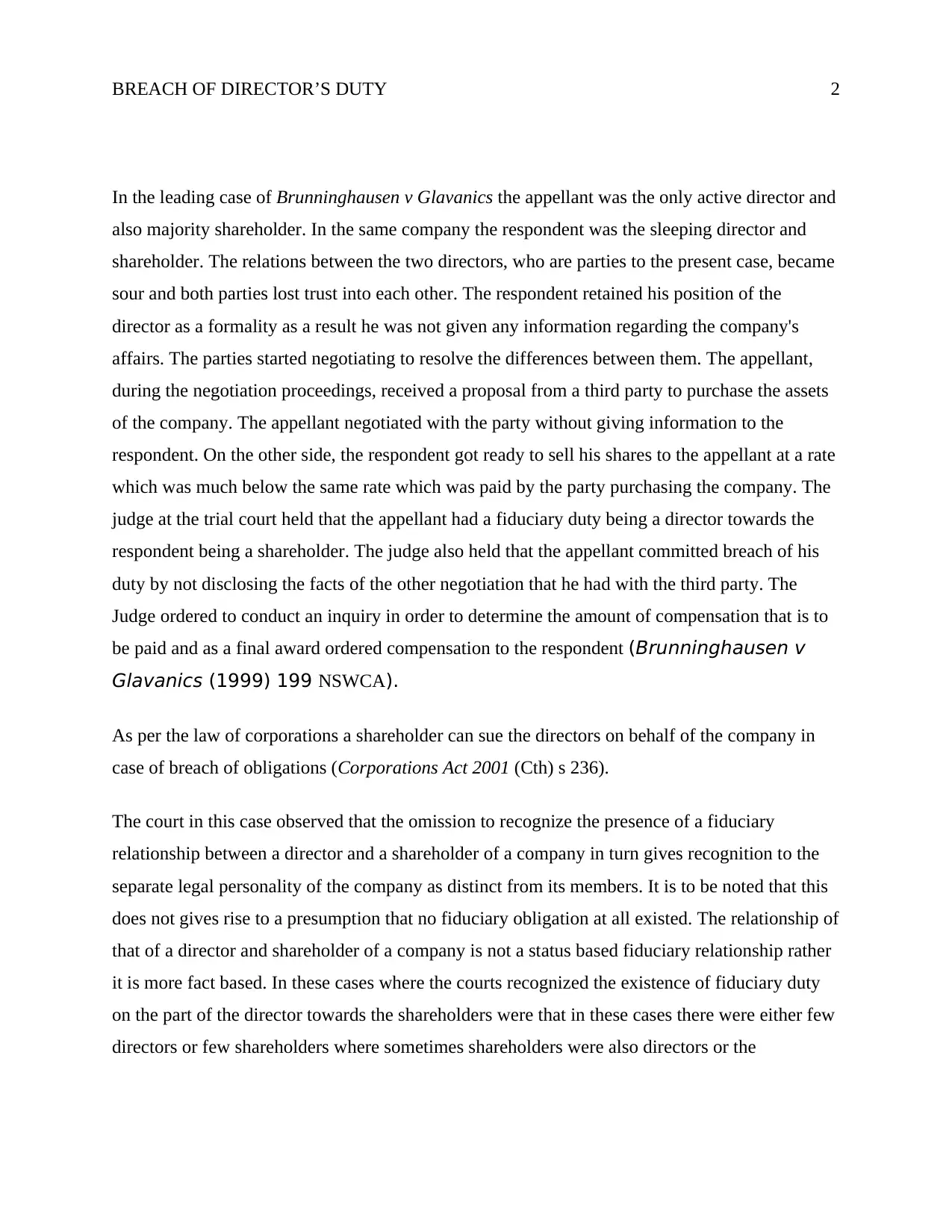
BREACH OF DIRECTOR’S DUTY 2
In the leading case of Brunninghausen v Glavanics the appellant was the only active director and
also majority shareholder. In the same company the respondent was the sleeping director and
shareholder. The relations between the two directors, who are parties to the present case, became
sour and both parties lost trust into each other. The respondent retained his position of the
director as a formality as a result he was not given any information regarding the company's
affairs. The parties started negotiating to resolve the differences between them. The appellant,
during the negotiation proceedings, received a proposal from a third party to purchase the assets
of the company. The appellant negotiated with the party without giving information to the
respondent. On the other side, the respondent got ready to sell his shares to the appellant at a rate
which was much below the same rate which was paid by the party purchasing the company. The
judge at the trial court held that the appellant had a fiduciary duty being a director towards the
respondent being a shareholder. The judge also held that the appellant committed breach of his
duty by not disclosing the facts of the other negotiation that he had with the third party. The
Judge ordered to conduct an inquiry in order to determine the amount of compensation that is to
be paid and as a final award ordered compensation to the respondent (Brunninghausen v
Glavanics (1999) 199 NSWCA).
As per the law of corporations a shareholder can sue the directors on behalf of the company in
case of breach of obligations (Corporations Act 2001 (Cth) s 236).
The court in this case observed that the omission to recognize the presence of a fiduciary
relationship between a director and a shareholder of a company in turn gives recognition to the
separate legal personality of the company as distinct from its members. It is to be noted that this
does not gives rise to a presumption that no fiduciary obligation at all existed. The relationship of
that of a director and shareholder of a company is not a status based fiduciary relationship rather
it is more fact based. In these cases where the courts recognized the existence of fiduciary duty
on the part of the director towards the shareholders were that in these cases there were either few
directors or few shareholders where sometimes shareholders were also directors or the
In the leading case of Brunninghausen v Glavanics the appellant was the only active director and
also majority shareholder. In the same company the respondent was the sleeping director and
shareholder. The relations between the two directors, who are parties to the present case, became
sour and both parties lost trust into each other. The respondent retained his position of the
director as a formality as a result he was not given any information regarding the company's
affairs. The parties started negotiating to resolve the differences between them. The appellant,
during the negotiation proceedings, received a proposal from a third party to purchase the assets
of the company. The appellant negotiated with the party without giving information to the
respondent. On the other side, the respondent got ready to sell his shares to the appellant at a rate
which was much below the same rate which was paid by the party purchasing the company. The
judge at the trial court held that the appellant had a fiduciary duty being a director towards the
respondent being a shareholder. The judge also held that the appellant committed breach of his
duty by not disclosing the facts of the other negotiation that he had with the third party. The
Judge ordered to conduct an inquiry in order to determine the amount of compensation that is to
be paid and as a final award ordered compensation to the respondent (Brunninghausen v
Glavanics (1999) 199 NSWCA).
As per the law of corporations a shareholder can sue the directors on behalf of the company in
case of breach of obligations (Corporations Act 2001 (Cth) s 236).
The court in this case observed that the omission to recognize the presence of a fiduciary
relationship between a director and a shareholder of a company in turn gives recognition to the
separate legal personality of the company as distinct from its members. It is to be noted that this
does not gives rise to a presumption that no fiduciary obligation at all existed. The relationship of
that of a director and shareholder of a company is not a status based fiduciary relationship rather
it is more fact based. In these cases where the courts recognized the existence of fiduciary duty
on the part of the director towards the shareholders were that in these cases there were either few
directors or few shareholders where sometimes shareholders were also directors or the
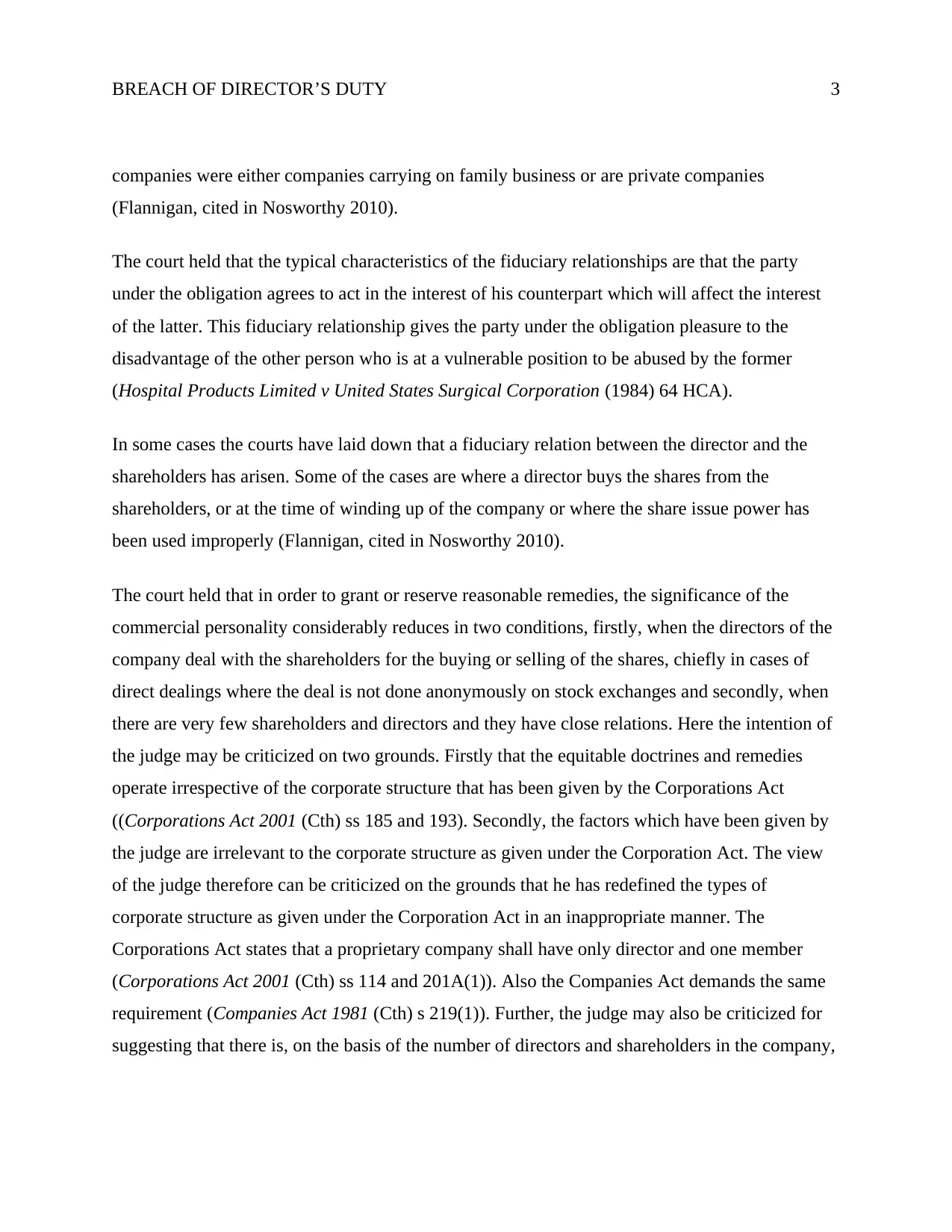
BREACH OF DIRECTOR’S DUTY 3
companies were either companies carrying on family business or are private companies
(Flannigan, cited in Nosworthy 2010).
The court held that the typical characteristics of the fiduciary relationships are that the party
under the obligation agrees to act in the interest of his counterpart which will affect the interest
of the latter. This fiduciary relationship gives the party under the obligation pleasure to the
disadvantage of the other person who is at a vulnerable position to be abused by the former
(Hospital Products Limited v United States Surgical Corporation (1984) 64 HCA).
In some cases the courts have laid down that a fiduciary relation between the director and the
shareholders has arisen. Some of the cases are where a director buys the shares from the
shareholders, or at the time of winding up of the company or where the share issue power has
been used improperly (Flannigan, cited in Nosworthy 2010).
The court held that in order to grant or reserve reasonable remedies, the significance of the
commercial personality considerably reduces in two conditions, firstly, when the directors of the
company deal with the shareholders for the buying or selling of the shares, chiefly in cases of
direct dealings where the deal is not done anonymously on stock exchanges and secondly, when
there are very few shareholders and directors and they have close relations. Here the intention of
the judge may be criticized on two grounds. Firstly that the equitable doctrines and remedies
operate irrespective of the corporate structure that has been given by the Corporations Act
((Corporations Act 2001 (Cth) ss 185 and 193). Secondly, the factors which have been given by
the judge are irrelevant to the corporate structure as given under the Corporation Act. The view
of the judge therefore can be criticized on the grounds that he has redefined the types of
corporate structure as given under the Corporation Act in an inappropriate manner. The
Corporations Act states that a proprietary company shall have only director and one member
(Corporations Act 2001 (Cth) ss 114 and 201A(1)). Also the Companies Act demands the same
requirement (Companies Act 1981 (Cth) s 219(1)). Further, the judge may also be criticized for
suggesting that there is, on the basis of the number of directors and shareholders in the company,
companies were either companies carrying on family business or are private companies
(Flannigan, cited in Nosworthy 2010).
The court held that the typical characteristics of the fiduciary relationships are that the party
under the obligation agrees to act in the interest of his counterpart which will affect the interest
of the latter. This fiduciary relationship gives the party under the obligation pleasure to the
disadvantage of the other person who is at a vulnerable position to be abused by the former
(Hospital Products Limited v United States Surgical Corporation (1984) 64 HCA).
In some cases the courts have laid down that a fiduciary relation between the director and the
shareholders has arisen. Some of the cases are where a director buys the shares from the
shareholders, or at the time of winding up of the company or where the share issue power has
been used improperly (Flannigan, cited in Nosworthy 2010).
The court held that in order to grant or reserve reasonable remedies, the significance of the
commercial personality considerably reduces in two conditions, firstly, when the directors of the
company deal with the shareholders for the buying or selling of the shares, chiefly in cases of
direct dealings where the deal is not done anonymously on stock exchanges and secondly, when
there are very few shareholders and directors and they have close relations. Here the intention of
the judge may be criticized on two grounds. Firstly that the equitable doctrines and remedies
operate irrespective of the corporate structure that has been given by the Corporations Act
((Corporations Act 2001 (Cth) ss 185 and 193). Secondly, the factors which have been given by
the judge are irrelevant to the corporate structure as given under the Corporation Act. The view
of the judge therefore can be criticized on the grounds that he has redefined the types of
corporate structure as given under the Corporation Act in an inappropriate manner. The
Corporations Act states that a proprietary company shall have only director and one member
(Corporations Act 2001 (Cth) ss 114 and 201A(1)). Also the Companies Act demands the same
requirement (Companies Act 1981 (Cth) s 219(1)). Further, the judge may also be criticized for
suggesting that there is, on the basis of the number of directors and shareholders in the company,
⊘ This is a preview!⊘
Do you want full access?
Subscribe today to unlock all pages.

Trusted by 1+ million students worldwide
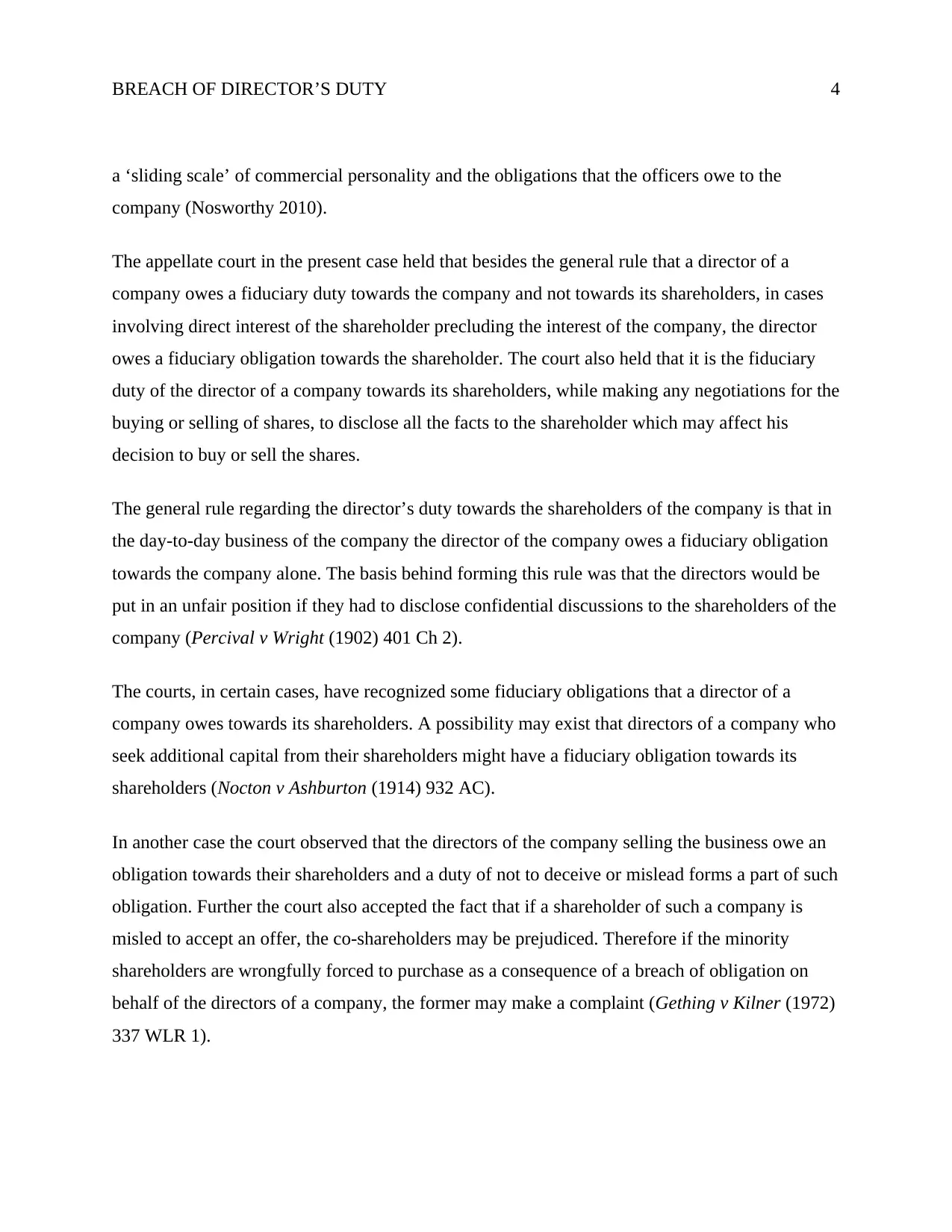
BREACH OF DIRECTOR’S DUTY 4
a ‘sliding scale’ of commercial personality and the obligations that the officers owe to the
company (Nosworthy 2010).
The appellate court in the present case held that besides the general rule that a director of a
company owes a fiduciary duty towards the company and not towards its shareholders, in cases
involving direct interest of the shareholder precluding the interest of the company, the director
owes a fiduciary obligation towards the shareholder. The court also held that it is the fiduciary
duty of the director of a company towards its shareholders, while making any negotiations for the
buying or selling of shares, to disclose all the facts to the shareholder which may affect his
decision to buy or sell the shares.
The general rule regarding the director’s duty towards the shareholders of the company is that in
the day-to-day business of the company the director of the company owes a fiduciary obligation
towards the company alone. The basis behind forming this rule was that the directors would be
put in an unfair position if they had to disclose confidential discussions to the shareholders of the
company (Percival v Wright (1902) 401 Ch 2).
The courts, in certain cases, have recognized some fiduciary obligations that a director of a
company owes towards its shareholders. A possibility may exist that directors of a company who
seek additional capital from their shareholders might have a fiduciary obligation towards its
shareholders (Nocton v Ashburton (1914) 932 AC).
In another case the court observed that the directors of the company selling the business owe an
obligation towards their shareholders and a duty of not to deceive or mislead forms a part of such
obligation. Further the court also accepted the fact that if a shareholder of such a company is
misled to accept an offer, the co-shareholders may be prejudiced. Therefore if the minority
shareholders are wrongfully forced to purchase as a consequence of a breach of obligation on
behalf of the directors of a company, the former may make a complaint (Gething v Kilner (1972)
337 WLR 1).
a ‘sliding scale’ of commercial personality and the obligations that the officers owe to the
company (Nosworthy 2010).
The appellate court in the present case held that besides the general rule that a director of a
company owes a fiduciary duty towards the company and not towards its shareholders, in cases
involving direct interest of the shareholder precluding the interest of the company, the director
owes a fiduciary obligation towards the shareholder. The court also held that it is the fiduciary
duty of the director of a company towards its shareholders, while making any negotiations for the
buying or selling of shares, to disclose all the facts to the shareholder which may affect his
decision to buy or sell the shares.
The general rule regarding the director’s duty towards the shareholders of the company is that in
the day-to-day business of the company the director of the company owes a fiduciary obligation
towards the company alone. The basis behind forming this rule was that the directors would be
put in an unfair position if they had to disclose confidential discussions to the shareholders of the
company (Percival v Wright (1902) 401 Ch 2).
The courts, in certain cases, have recognized some fiduciary obligations that a director of a
company owes towards its shareholders. A possibility may exist that directors of a company who
seek additional capital from their shareholders might have a fiduciary obligation towards its
shareholders (Nocton v Ashburton (1914) 932 AC).
In another case the court observed that the directors of the company selling the business owe an
obligation towards their shareholders and a duty of not to deceive or mislead forms a part of such
obligation. Further the court also accepted the fact that if a shareholder of such a company is
misled to accept an offer, the co-shareholders may be prejudiced. Therefore if the minority
shareholders are wrongfully forced to purchase as a consequence of a breach of obligation on
behalf of the directors of a company, the former may make a complaint (Gething v Kilner (1972)
337 WLR 1).
Paraphrase This Document
Need a fresh take? Get an instant paraphrase of this document with our AI Paraphraser
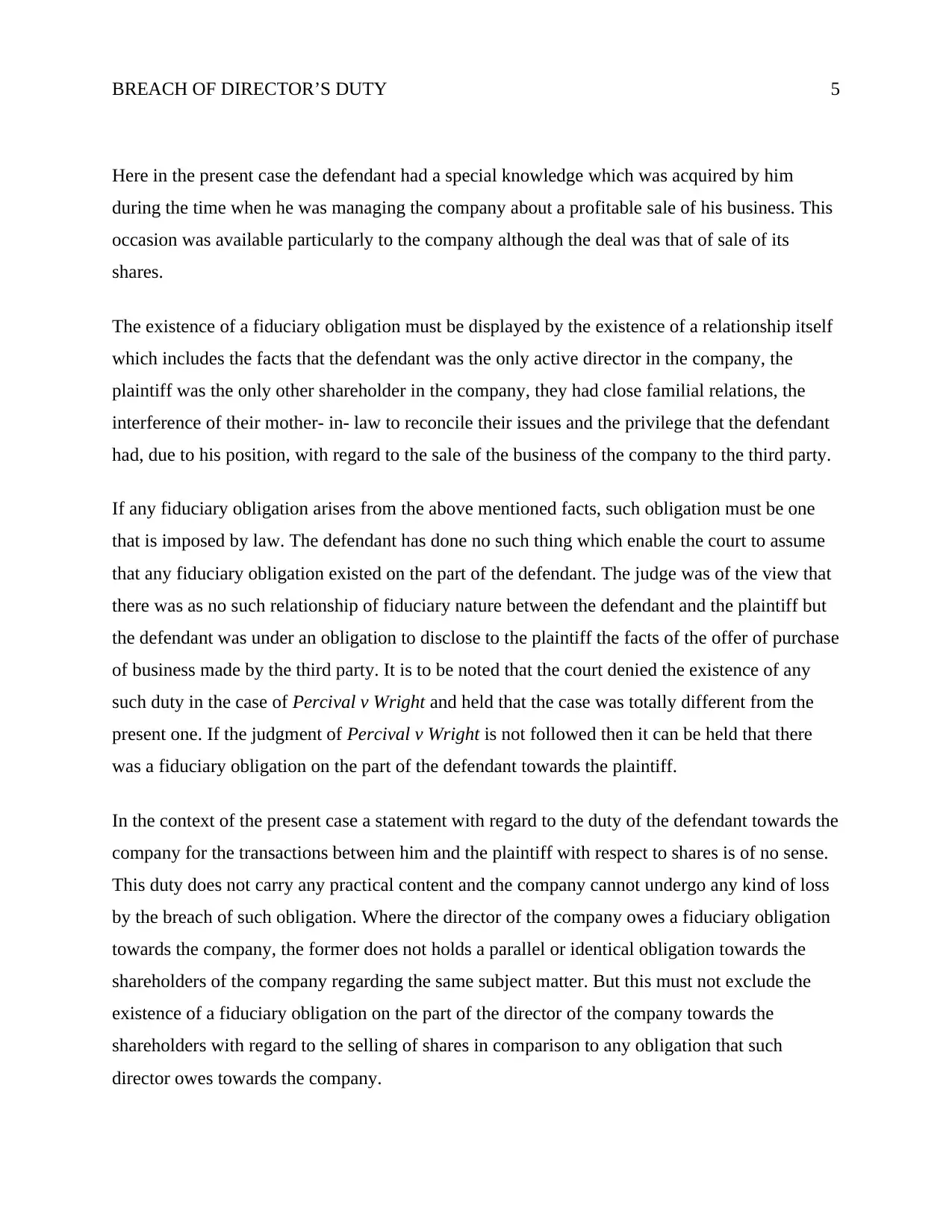
BREACH OF DIRECTOR’S DUTY 5
Here in the present case the defendant had a special knowledge which was acquired by him
during the time when he was managing the company about a profitable sale of his business. This
occasion was available particularly to the company although the deal was that of sale of its
shares.
The existence of a fiduciary obligation must be displayed by the existence of a relationship itself
which includes the facts that the defendant was the only active director in the company, the
plaintiff was the only other shareholder in the company, they had close familial relations, the
interference of their mother- in- law to reconcile their issues and the privilege that the defendant
had, due to his position, with regard to the sale of the business of the company to the third party.
If any fiduciary obligation arises from the above mentioned facts, such obligation must be one
that is imposed by law. The defendant has done no such thing which enable the court to assume
that any fiduciary obligation existed on the part of the defendant. The judge was of the view that
there was as no such relationship of fiduciary nature between the defendant and the plaintiff but
the defendant was under an obligation to disclose to the plaintiff the facts of the offer of purchase
of business made by the third party. It is to be noted that the court denied the existence of any
such duty in the case of Percival v Wright and held that the case was totally different from the
present one. If the judgment of Percival v Wright is not followed then it can be held that there
was a fiduciary obligation on the part of the defendant towards the plaintiff.
In the context of the present case a statement with regard to the duty of the defendant towards the
company for the transactions between him and the plaintiff with respect to shares is of no sense.
This duty does not carry any practical content and the company cannot undergo any kind of loss
by the breach of such obligation. Where the director of the company owes a fiduciary obligation
towards the company, the former does not holds a parallel or identical obligation towards the
shareholders of the company regarding the same subject matter. But this must not exclude the
existence of a fiduciary obligation on the part of the director of the company towards the
shareholders with regard to the selling of shares in comparison to any obligation that such
director owes towards the company.
Here in the present case the defendant had a special knowledge which was acquired by him
during the time when he was managing the company about a profitable sale of his business. This
occasion was available particularly to the company although the deal was that of sale of its
shares.
The existence of a fiduciary obligation must be displayed by the existence of a relationship itself
which includes the facts that the defendant was the only active director in the company, the
plaintiff was the only other shareholder in the company, they had close familial relations, the
interference of their mother- in- law to reconcile their issues and the privilege that the defendant
had, due to his position, with regard to the sale of the business of the company to the third party.
If any fiduciary obligation arises from the above mentioned facts, such obligation must be one
that is imposed by law. The defendant has done no such thing which enable the court to assume
that any fiduciary obligation existed on the part of the defendant. The judge was of the view that
there was as no such relationship of fiduciary nature between the defendant and the plaintiff but
the defendant was under an obligation to disclose to the plaintiff the facts of the offer of purchase
of business made by the third party. It is to be noted that the court denied the existence of any
such duty in the case of Percival v Wright and held that the case was totally different from the
present one. If the judgment of Percival v Wright is not followed then it can be held that there
was a fiduciary obligation on the part of the defendant towards the plaintiff.
In the context of the present case a statement with regard to the duty of the defendant towards the
company for the transactions between him and the plaintiff with respect to shares is of no sense.
This duty does not carry any practical content and the company cannot undergo any kind of loss
by the breach of such obligation. Where the director of the company owes a fiduciary obligation
towards the company, the former does not holds a parallel or identical obligation towards the
shareholders of the company regarding the same subject matter. But this must not exclude the
existence of a fiduciary obligation on the part of the director of the company towards the
shareholders with regard to the selling of shares in comparison to any obligation that such
director owes towards the company.
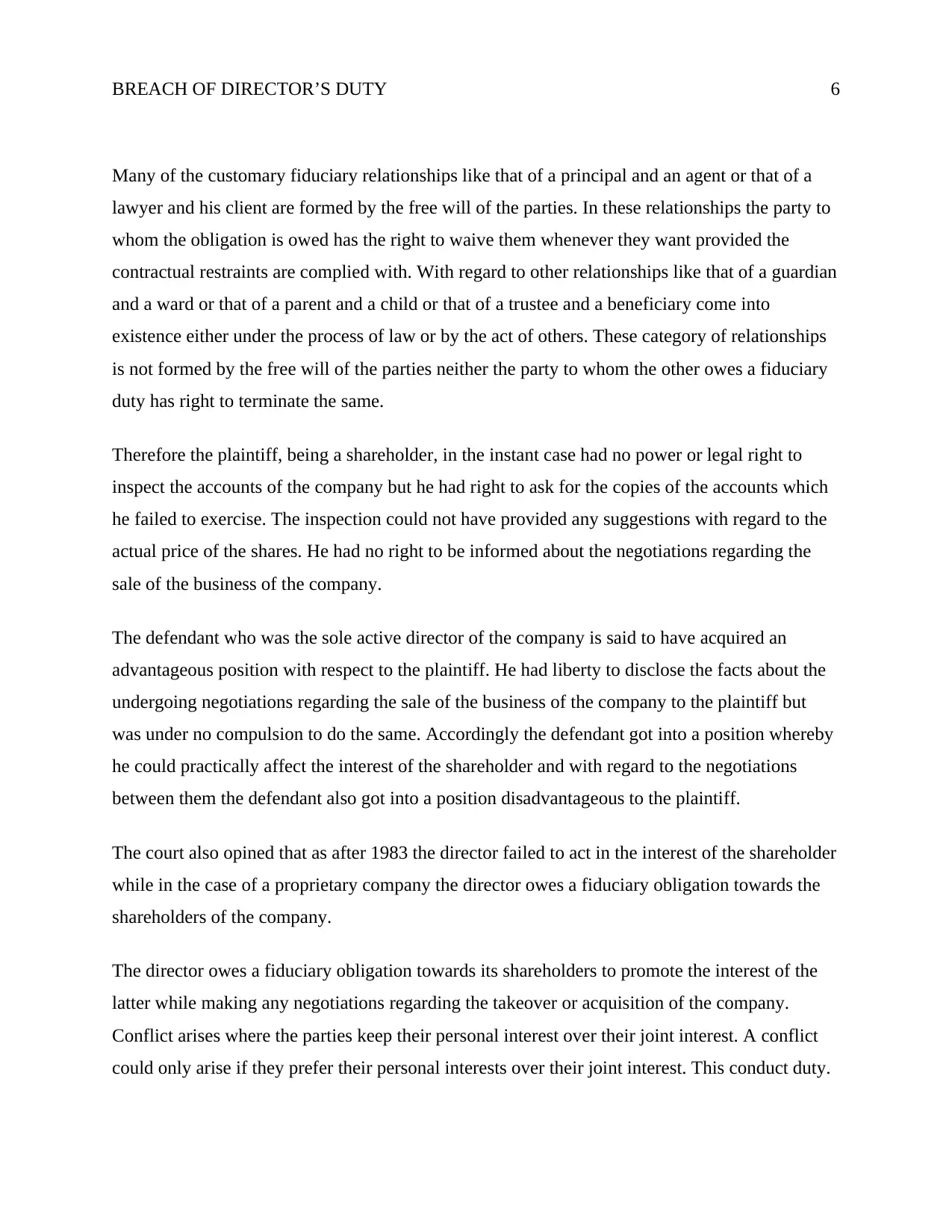
BREACH OF DIRECTOR’S DUTY 6
Many of the customary fiduciary relationships like that of a principal and an agent or that of a
lawyer and his client are formed by the free will of the parties. In these relationships the party to
whom the obligation is owed has the right to waive them whenever they want provided the
contractual restraints are complied with. With regard to other relationships like that of a guardian
and a ward or that of a parent and a child or that of a trustee and a beneficiary come into
existence either under the process of law or by the act of others. These category of relationships
is not formed by the free will of the parties neither the party to whom the other owes a fiduciary
duty has right to terminate the same.
Therefore the plaintiff, being a shareholder, in the instant case had no power or legal right to
inspect the accounts of the company but he had right to ask for the copies of the accounts which
he failed to exercise. The inspection could not have provided any suggestions with regard to the
actual price of the shares. He had no right to be informed about the negotiations regarding the
sale of the business of the company.
The defendant who was the sole active director of the company is said to have acquired an
advantageous position with respect to the plaintiff. He had liberty to disclose the facts about the
undergoing negotiations regarding the sale of the business of the company to the plaintiff but
was under no compulsion to do the same. Accordingly the defendant got into a position whereby
he could practically affect the interest of the shareholder and with regard to the negotiations
between them the defendant also got into a position disadvantageous to the plaintiff.
The court also opined that as after 1983 the director failed to act in the interest of the shareholder
while in the case of a proprietary company the director owes a fiduciary obligation towards the
shareholders of the company.
The director owes a fiduciary obligation towards its shareholders to promote the interest of the
latter while making any negotiations regarding the takeover or acquisition of the company.
Conflict arises where the parties keep their personal interest over their joint interest. A conflict
could only arise if they prefer their personal interests over their joint interest. This conduct duty.
Many of the customary fiduciary relationships like that of a principal and an agent or that of a
lawyer and his client are formed by the free will of the parties. In these relationships the party to
whom the obligation is owed has the right to waive them whenever they want provided the
contractual restraints are complied with. With regard to other relationships like that of a guardian
and a ward or that of a parent and a child or that of a trustee and a beneficiary come into
existence either under the process of law or by the act of others. These category of relationships
is not formed by the free will of the parties neither the party to whom the other owes a fiduciary
duty has right to terminate the same.
Therefore the plaintiff, being a shareholder, in the instant case had no power or legal right to
inspect the accounts of the company but he had right to ask for the copies of the accounts which
he failed to exercise. The inspection could not have provided any suggestions with regard to the
actual price of the shares. He had no right to be informed about the negotiations regarding the
sale of the business of the company.
The defendant who was the sole active director of the company is said to have acquired an
advantageous position with respect to the plaintiff. He had liberty to disclose the facts about the
undergoing negotiations regarding the sale of the business of the company to the plaintiff but
was under no compulsion to do the same. Accordingly the defendant got into a position whereby
he could practically affect the interest of the shareholder and with regard to the negotiations
between them the defendant also got into a position disadvantageous to the plaintiff.
The court also opined that as after 1983 the director failed to act in the interest of the shareholder
while in the case of a proprietary company the director owes a fiduciary obligation towards the
shareholders of the company.
The director owes a fiduciary obligation towards its shareholders to promote the interest of the
latter while making any negotiations regarding the takeover or acquisition of the company.
Conflict arises where the parties keep their personal interest over their joint interest. A conflict
could only arise if they prefer their personal interests over their joint interest. This conduct duty.
⊘ This is a preview!⊘
Do you want full access?
Subscribe today to unlock all pages.

Trusted by 1+ million students worldwide
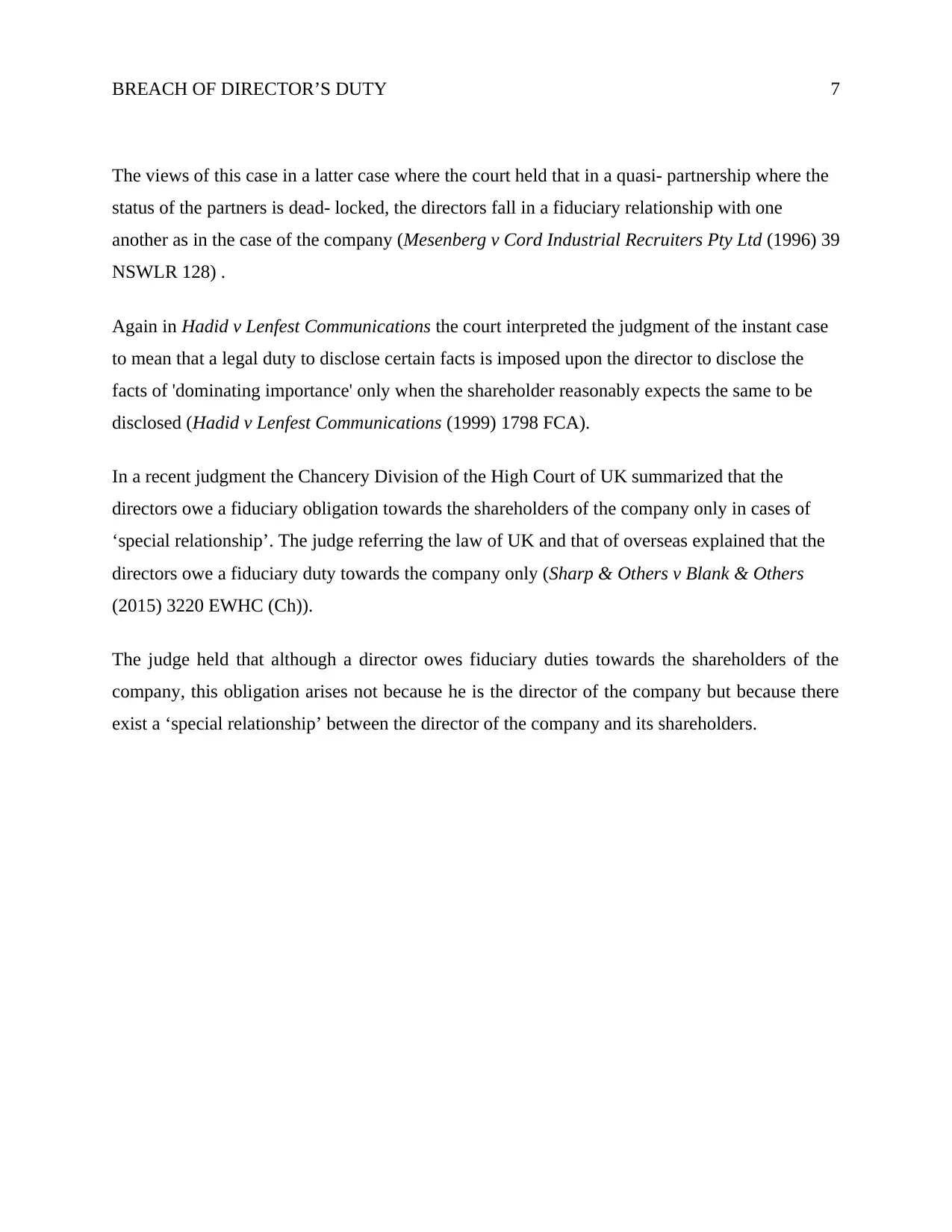
BREACH OF DIRECTOR’S DUTY 7
The views of this case in a latter case where the court held that in a quasi- partnership where the
status of the partners is dead- locked, the directors fall in a fiduciary relationship with one
another as in the case of the company (Mesenberg v Cord Industrial Recruiters Pty Ltd (1996) 39
NSWLR 128) .
Again in Hadid v Lenfest Communications the court interpreted the judgment of the instant case
to mean that a legal duty to disclose certain facts is imposed upon the director to disclose the
facts of 'dominating importance' only when the shareholder reasonably expects the same to be
disclosed (Hadid v Lenfest Communications (1999) 1798 FCA).
In a recent judgment the Chancery Division of the High Court of UK summarized that the
directors owe a fiduciary obligation towards the shareholders of the company only in cases of
‘special relationship’. The judge referring the law of UK and that of overseas explained that the
directors owe a fiduciary duty towards the company only (Sharp & Others v Blank & Others
(2015) 3220 EWHC (Ch)).
The judge held that although a director owes fiduciary duties towards the shareholders of the
company, this obligation arises not because he is the director of the company but because there
exist a ‘special relationship’ between the director of the company and its shareholders.
The views of this case in a latter case where the court held that in a quasi- partnership where the
status of the partners is dead- locked, the directors fall in a fiduciary relationship with one
another as in the case of the company (Mesenberg v Cord Industrial Recruiters Pty Ltd (1996) 39
NSWLR 128) .
Again in Hadid v Lenfest Communications the court interpreted the judgment of the instant case
to mean that a legal duty to disclose certain facts is imposed upon the director to disclose the
facts of 'dominating importance' only when the shareholder reasonably expects the same to be
disclosed (Hadid v Lenfest Communications (1999) 1798 FCA).
In a recent judgment the Chancery Division of the High Court of UK summarized that the
directors owe a fiduciary obligation towards the shareholders of the company only in cases of
‘special relationship’. The judge referring the law of UK and that of overseas explained that the
directors owe a fiduciary duty towards the company only (Sharp & Others v Blank & Others
(2015) 3220 EWHC (Ch)).
The judge held that although a director owes fiduciary duties towards the shareholders of the
company, this obligation arises not because he is the director of the company but because there
exist a ‘special relationship’ between the director of the company and its shareholders.
Paraphrase This Document
Need a fresh take? Get an instant paraphrase of this document with our AI Paraphraser

BREACH OF DIRECTOR’S DUTY 8
1 out of 8
Related Documents
Your All-in-One AI-Powered Toolkit for Academic Success.
+13062052269
info@desklib.com
Available 24*7 on WhatsApp / Email
![[object Object]](/_next/static/media/star-bottom.7253800d.svg)
Unlock your academic potential
Copyright © 2020–2026 A2Z Services. All Rights Reserved. Developed and managed by ZUCOL.



![ASIC v Maxwell & Ors [2006] NSWSC 1052 Case: Corporations Law Analysis](/_next/image/?url=https%3A%2F%2Fdesklib.com%2Fmedia%2Fimages%2Fry%2F57e8c573017544d2978be5debb1abc0d.jpg&w=256&q=75)

